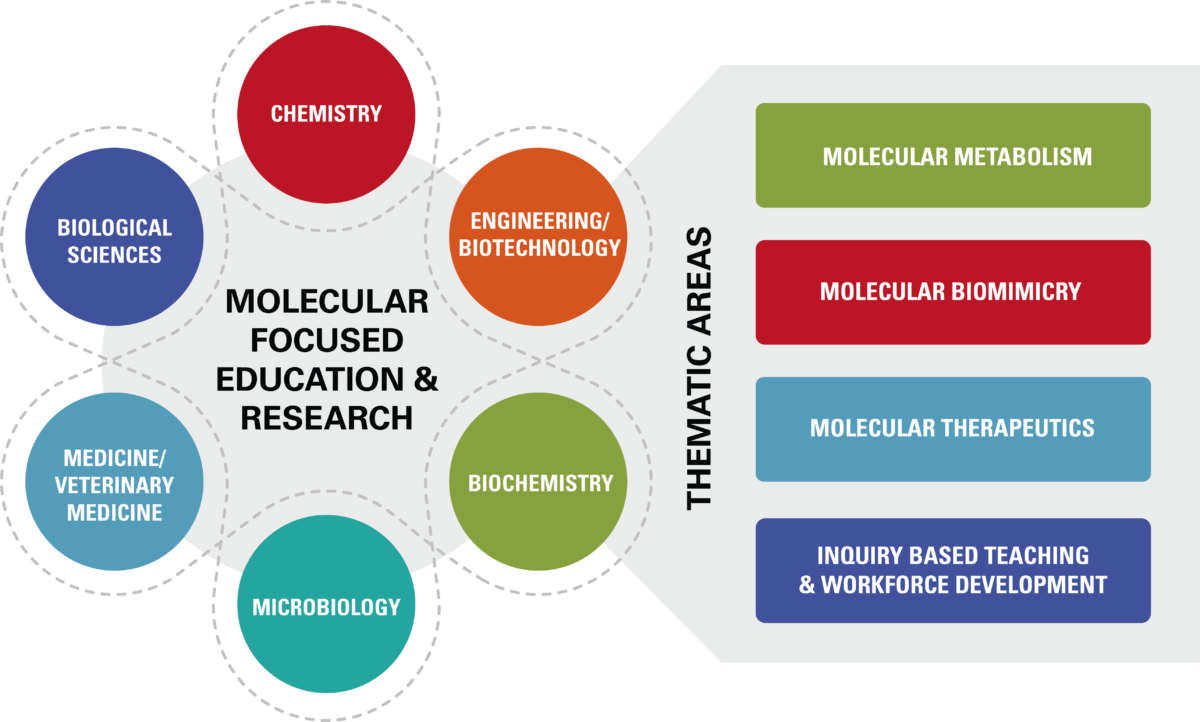
Chemistry of Life Research Themes
Faculty within the CMI across four colleges at NC State are using molecular approaches to tackle some of the largest issues facing humanity. From drug discovery and synthetic biology to novel biomaterials and molecular characterization, faculty are working together to make a meaningful impact across our State of North Carolina, Country and World. The Chemistry of Life Program is designed to fuel the already robust research activities while training the next generation of scientific leaders and represents a molecular-focused subset of research within the CMI — from molecules to translational animal and plant science. The following are the focus areas that CLP will focus our research and training programs on, and these areas complement or are synergistic with programs that make up the broader CMI. These research themes are the foundation for the recently announced Integrative Sciences Initiative and Building, and present an opportunity to further bridge the molecular sciences across campus.

Molecular Mechanisms of Metabolism and Disease
Theme Lead: Melanie Simpson (CALS/Biochemistry), Associate Director of CMI-CLP
A deep understanding of metabolic pathways impacted by disease progression is necessary to meet grand societal challenges and develop potential treatments. Faculty in this theme will focus on understanding and exploiting basic metabolic pathways and the protein-specific mechanisms within those pathways. Research projects will support the overarching goals of defining novel diagnostic and therapeutic applications, by identifying novel biomolecules involved in signaling and function, both in normal systems and in pathological conditions that promote susceptibility to infectious disease and cancer. This theme is envisioned to contribute centrally to the success of faculty with their major focus in the other two themes, and is by nature highly interdisciplinary. Core infrastructure will be centered around approaches to measure changes in molecules, cells, tissues and organisms as disease is initiated and throughout the course of progression, as well as those that indicate a response to potential therapeutics. Shared instrumentation is envisioned to support a comprehensive imaging core, and versatile facilities for assay development involving molecular technologies.
Molecular Synthesis and Biomimicry
Theme Lead: Joshua Pierce (COS/Chemistry), Co-Director of CMI and Director of Integrative Sciences Initiative
Transformative scientific and medical breakthroughs will require access to novel molecular structures and expedited access to emerging therapeutics. Faculty in this theme will leverage interdisciplinary research in synthetic chemistry, chemical biology, and synthetic biology to develop next-generation approaches to access small molecules and biomolecules. The assembly of teams across these disciplines will provide a remarkable opportunity for discovery, and will be designed to take advantage of each discipline’s strengths. Core infrastructure will utilize high-throughput technologies and shared instrumentation to accelerate these efforts through the creation of a ‘molecular foundry’. Researchers in this theme will engage the other themes to study the novel compounds in model systems of infectious disease and cancer and in animal models of disease.
Molecular Therapeutics and Applied Molecular Sciences
Theme Lead: Yevgeny Brudno (COE/Biomedical Engineering), Associate Director of CMI-CLP
Promising therapeutic candidates require validation in disease models to realize full translational potential, and thus there is a large need for innovative models that can better mimic human disease. Faculty in this theme will develop next-generation therapeutic interventions and test promising drug candidates to meet critical clinical needs in infectious disease and cancer. Core infrastructure centers on cellular, organoid and animal models of health and disease to test promising small molecule and biomolecule leads and clinical candidates. The molecular therapeutics theme will also interface with the Office of Research Commercialization, clinicians, and industry partners throughout North Carolina to bring critical therapies to patients.
The Chemistry of Life Program is collaborative with a number of other interdisciplinary research programs on campus, leveraging training and coursework as well as infrastructure. CLP is part of the broader Comparative Medicine Institute and has key partners including the Biotechnology Program, the Genetics and Genomics Academy, the Global Health Program, METRIC, and the Office of Research Commercialization. CLP is the foundation of the Integrative Sciences Initiative and Building.
